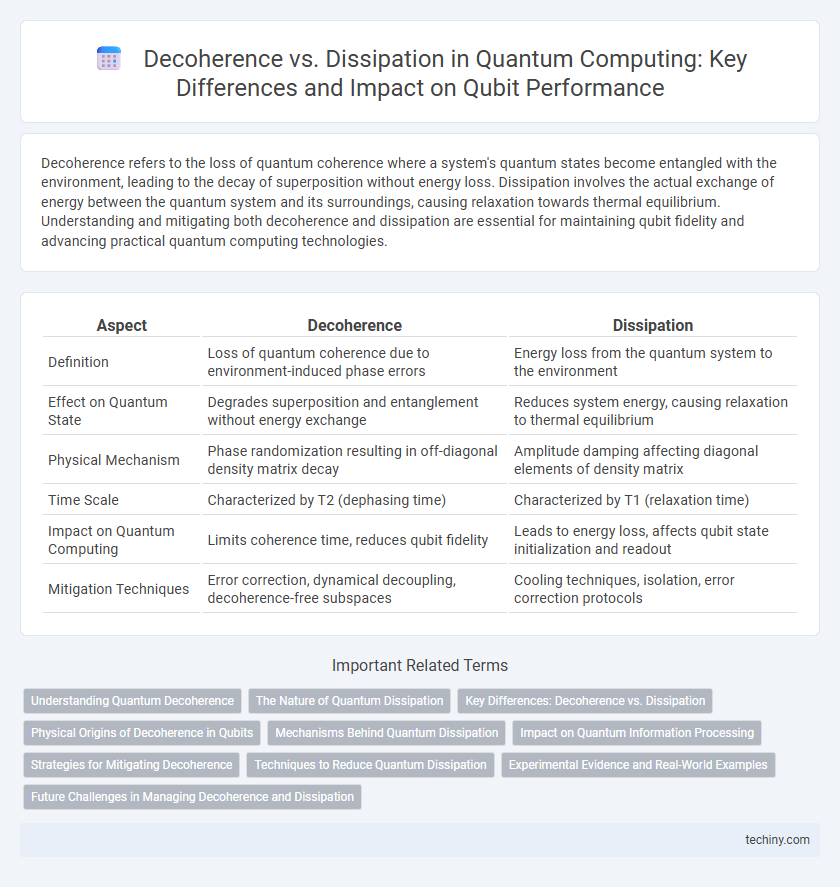Decoherence refers to the loss of quantum coherence where a system's quantum states become entangled with the environment, leading to the decay of superposition without energy loss. Dissipation involves the actual exchange of energy between the quantum system and its surroundings, causing relaxation towards thermal equilibrium. Understanding and mitigating both decoherence and dissipation are essential for maintaining qubit fidelity and advancing practical quantum computing technologies.
Table of Comparison
| Aspect | Decoherence | Dissipation |
|---|---|---|
| Definition | Loss of quantum coherence due to environment-induced phase errors | Energy loss from the quantum system to the environment |
| Effect on Quantum State | Degrades superposition and entanglement without energy exchange | Reduces system energy, causing relaxation to thermal equilibrium |
| Physical Mechanism | Phase randomization resulting in off-diagonal density matrix decay | Amplitude damping affecting diagonal elements of density matrix |
| Time Scale | Characterized by T2 (dephasing time) | Characterized by T1 (relaxation time) |
| Impact on Quantum Computing | Limits coherence time, reduces qubit fidelity | Leads to energy loss, affects qubit state initialization and readout |
| Mitigation Techniques | Error correction, dynamical decoupling, decoherence-free subspaces | Cooling techniques, isolation, error correction protocols |
Understanding Quantum Decoherence
Quantum decoherence describes the loss of quantum coherence due to the system's interaction with its surrounding environment, leading to the decay of superposition states and the emergence of classical probabilities. Unlike dissipation, which involves the transfer of energy from the quantum system to the environment, decoherence primarily affects the phase relationships between quantum states without necessarily involving energy loss. Understanding quantum decoherence is crucial for developing error correction protocols and designing stable qubits to maintain quantum information integrity in quantum computing systems.
The Nature of Quantum Dissipation
Quantum dissipation refers to the irreversible loss of energy from a quantum system to its surrounding environment, typically causing a gradual reduction in the system's coherence and quantum information integrity. Unlike decoherence, which involves the loss of phase relationships between quantum states without necessarily losing energy, dissipation directly impacts the system's energy levels and state populations. Understanding the mechanisms of quantum dissipation is crucial for developing error-resistant quantum computing technologies and maintaining qubit stability over time.
Key Differences: Decoherence vs. Dissipation
Decoherence involves the loss of quantum coherence caused by the environment, leading to the decay of superposition states without energy exchange. Dissipation refers to the irreversible loss of energy from the quantum system to its surroundings, impacting the system's state populations. Key differences lie in decoherence disrupting phase relations while dissipation affects both phase and energy, crucial in maintaining qubit fidelity in quantum computing.
Physical Origins of Decoherence in Qubits
Decoherence in qubits arises primarily from interactions with surrounding environmental degrees of freedom, such as phonons, electromagnetic fluctuations, and spin baths, which induce phase randomization without energy loss. Unlike dissipation, where energy exchange leads to relaxation of the qubit state, decoherence causes loss of quantum coherence by entangling the qubit with uncontrollable environmental states. Understanding the microscopic mechanisms--like charge noise in superconducting qubits or hyperfine interactions in spin qubits--is crucial for developing error correction and noise mitigation strategies in quantum computing architectures.
Mechanisms Behind Quantum Dissipation
Quantum dissipation primarily arises from the irreversible flow of energy from a quantum system to its surrounding environment, often modeled by system-bath interactions. Key mechanisms include phonon scattering, electromagnetic fluctuations, and coupling to external reservoirs, which lead to energy relaxation and loss of quantum information. Unlike decoherence that destroys phase relationships in a quantum superposition, dissipation entails the actual transfer of energy out of the quantum system, affecting its thermodynamic properties and operational fidelity.
Impact on Quantum Information Processing
Decoherence disrupts quantum coherence by causing qubits to lose their superposition states through interaction with the environment, severely limiting the fidelity of quantum computations. Dissipation leads to energy loss from the quantum system, driving qubits toward thermal equilibrium and reducing their ability to maintain quantum information. Both decoherence and dissipation critically undermine error rates and coherence times, posing significant challenges for scalable and reliable quantum information processing.
Strategies for Mitigating Decoherence
Quantum computing faces significant challenges from decoherence, which disrupts qubit states without energy loss, distinct from dissipation that involves energy exchange with the environment. Error correction codes such as surface codes and dynamical decoupling techniques play critical roles in mitigating decoherence by preserving coherence times and protecting quantum information. Advancements in materials science and environmental isolation also enhance qubit stability, thereby improving the fidelity and scalability of quantum processors.
Techniques to Reduce Quantum Dissipation
Quantum dissipation, the loss of energy from a quantum system to its environment, is mitigated using techniques such as dynamical decoupling, which applies rapid, precise control pulses to isolate qubits from external noise. Quantum error correction codes detect and correct errors caused by dissipation, preserving coherence and information integrity over extended periods. Engineering optimized qubit materials with lower intrinsic loss and leveraging cryogenic environments also significantly reduce dissipation rates in quantum processors.
Experimental Evidence and Real-World Examples
Experimental evidence in quantum computing highlights decoherence as the primary challenge, where qubit states lose coherence due to environmental noise, undermining quantum information integrity. Real-world examples, such as superconducting qubits and trapped ions, demonstrate decoherence times ranging from microseconds to milliseconds, far shorter than ideal, requiring error correction protocols. Dissipation, involving energy loss to the environment, also affects qubit performance but is often masked within decoherence processes observed in quantum devices during experiments.
Future Challenges in Managing Decoherence and Dissipation
Managing decoherence and dissipation remains a critical future challenge for scalable quantum computing, as both phenomena degrade qubit coherence times and operational fidelity. Advanced error correction techniques and material innovations are essential to mitigate environmental noise and energy loss that disrupt quantum states. Precise control over qubit-environment interactions and development of robust isolation methods will drive progress in sustaining quantum coherence for extended computational processes.
decoherence vs dissipation Infographic

 techiny.com
techiny.com